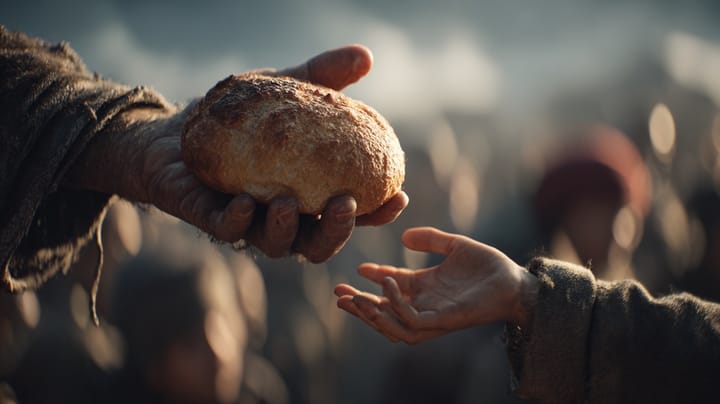Fairhaven Sermon 3-10-2024
The bronze serpent by itself does nothing...If your brother or sister looks at the bronze serpent, it won't help you if you're the one who's been bitten. You get the idea.

This sermon by Rev. Peg Bowman focuses on the biblical story of the bronze serpent that God instructed Moses to make in the wilderness, comparing it to Jesus being lifted up on the cross. The Israelites had sinned by complaining against God, so God sent venomous snakes that bit the people. God then told Moses to make a bronze serpent on a pole, and anyone who looked at it would be healed from the snake bites. Jesus references this story in his conversation with Nicodemus, saying that just as the bronze serpent was lifted up to heal the Israelites bitten by snakes, so the Son of Man must be lifted up on the cross so that whoever believes in him will have eternal life. This illustrates that sin is like the venom from the snake bites, but looking to Jesus and his sacrifice on the cross is the antidote that brings healing and eternal life.
Rev. Bowman emphasizes that each person must look to the cross themselves, just as each Israelite had to look at the bronze serpent to be healed - no one else could do it for them. While she acknowledges it can be hard for those who have experienced trauma to trust God, the cross shows God has entered into human suffering. Therefore, her message is that although all have been "bitten by sin," healing is available by looking to Christ on the cross, made possible because "God so loved the world."
Transcript
Welcome to the fourth week of Lent and our theme for today, which is the venom and the antidotes. It's kind of an odd title for a sermon and it immediately raises questions. So I'll start off by saying, yes, we actually are talking about real venom and yes, we actually are talking about a real cure, but these are obviously also meant to be metaphors in the way of describing the life of faith in Jesus. So I'd like to start with Jesus today and our reading from the Gospel of John.
This passage that we just heard includes one of the most famous verses in the Bible, John 3, 16, something that many of us memorized in Sunday school. And this verse, of course, gained worldwide fame thanks to a man by the name of Roland Stewart who spent amazing amounts of time and money attending sports events around the world a few years ago and buying seats where he knew the TV cameras would be either like behind home plate or behind the end zone. And he would hold up a sign reading John 3, 16. Now full disclosure, this guy is a bit nuts and he's currently in prison, okay? But during the latter part of the previous century, he brought this verse to everyone's attention, including a contractor I used to know who worked on my house back in the 90s.
One evening when a group of us were out having dinner at a local bar, a football game came on TV and this John 3, 16 sign made an appearance. And the contractor looked at me as the one churchgoer at the table and said, What does that mean? And I said, It's a Bible verse. He said, Yeah, but you know what it is, preacher lady. And I was like, I had not been to seminary yet.
I knew it, but I said, Yes, I know what it is. And he said, Well? I said, You want me to actually say this right here in a bar? He said, Yeah. I said, Okay. For God so loved the world that he gave his only son, so anyone who believes in him may not perish but have eternal life.
And he thought that over for a second and he said, Cool. And all of his buddies at the table went, Cool. And they carried on with their conversations. And so I have it on good authority, John 3, 16 is cool.
But that's not all there is to this passage. In fact, John 3, 16 is not even really the main point of the conversation that Jesus is having at this point in time. In this passage, actually as we read it today, it actually came in the middle of a conversation between Jesus and a Pharisee named Nicodemus. And Nicodemus is one of my favorite people in the Bible because he's an honest Pharisee.
He's a member of the Sanhedrin, the body of religious rulers in Jerusalem, but he's not a hypocrite. Nicodemus thinks for himself and where it comes to Jesus, he's honestly curious. He wants to know what Jesus is teaching about and he wants to ask questions. And he's also at this point in time aware that many of his co-Pharisees are already conspiring to kill Jesus and he wants to give Jesus a heads up about this.
So he does something kind of risky. He comes to Jesus in person at night and asks to have a word alone with Jesus. And he starts the conversation by saying, Rabbi, we know that you're a teacher who comes from God, for no one can do the signs that you do apart from the presence of God. Now this is a stunning confession.
First off, he says, We know. We know. The Pharisees know who Jesus is. They know Jesus is from God.
And that doesn't stop them, all their plotting and planning. They can't face the truth of what Jesus teaches, but Nicodemus has decided to be different. And Jesus is very up front with Nicodemus from the very start, but he takes the conversation in a direction that Nicodemus doesn't expect. Jesus says, No one can see the kingdom of God without being born from above.
And the conversation then continues along the lines of what it means to be born again or born from above or born of the Spirit. Bottom line, Jesus says salvation from God is not about keeping rules. Salvation is a miracle by which God's Spirit, the Holy Spirit, the third person of the Trinity comes into a person and lives in the heart of a person who is willing to worship and follow God. Now this sounds like a brand new teaching to the people in Jesus' time, but it's actually a new presentation of very ancient truths.
And Nicodemus is a bit confused. And Jesus scolds him gently saying, You're a teacher of Israel and you don't know these things. And he goes on to explain that while God loves the world and God loves the people in it, people love darkness because what they do is evil. But while this was still going on, God sent the Son as a Savior.
And Jesus says, Just as Moses lifted up that serpent in the wilderness, so must the Son of God, Son of Man, be lifted up that whoever believes in Him may have eternal life. Why? Because God so loved the world that He gave His only Son. But this is the judgment. The light of God came into the world, but people loved darkness more because their deeds were evil.
And Nicodemus, being the well-educated Pharisee that he was, immediately recognized and remembered the story of the serpent in the wilderness that Jesus is talking about. His mind would have gone back to the book of Numbers and that last part of Israel's journey in the wilderness that we just heard read about. Again, a passage we don't hear very often and just kind of jumps out as, What are we talking about here? Here's the story of what happened back then. The people of Israel at that time had been traveling through the wilderness for almost 40 years.
They were on their way. They were almost to where they were going. Many of the people who had been freed from Egypt had grown old and passed away by this point and others were elderly. And most likely the majority of the people in the tribe of Israel no longer remembered Egypt.
All they'd ever known was this life on a journey and the leadership of Moses. And at this point, the people of Israel were setting out from Mount Hor, and I'm kind of the direction here, like here, and Israel's up here, but they have to go this way to get there, okay? And so they're heading south to go north, and it looked like they were going in the wrong direction and the people started to protest this because they had to go around the land of Edom at that point. God was trying to prevent them getting caught up in a war. And so they were going the wrong way and the people are getting impatient and they complain about both Moses and God, and their complaints were full of lies.
They accused Moses of bringing them into the wilderness to die. They accused God of starving them to death, but then they go on in the next sentence and say, We detest this miserable food. So not like they're starving. The food is actually manna.
This is the bread of angels. Wonderful stuff. They say it tasted like wafers with honey, but they're so sick of manna. So as they accused the Lord of life, trying to starve them and kill them.
Now, first off, it is not wise for human beings to cop an attitude with God. Not a good idea. Secondly, as one theologian writes, the accusations against God were serpentine in nature, poisonous, biting, bitter, self-contradictory. And God needs to confront this rebellion.
If God does not confront the evil, it will grow and spread and it will result in the deaths of many people, if not the entire tribe of Israel, who are still dependent on God and Moses to get them to the promised land. On this journey, the people still need God every step of the way. But the people think otherwise. So God sends poisonous snakes into the camp and the snakes bite some of the people and the people who are bitten die.
In reaction to this, the people say to Moses, We have sinned. Pray to God to take the snakes away. Now why do the people interpret the snakes as having been sent by God to confront them about their sins? How did they put that? I don't know how they got that together, but they did. Probably points to some guilty consciences, if nothing else.
And apart from this, it does seem like in the history of the human race that people turn to God more quickly in times of trouble than they do when things are going well. And that's what happens here. But God does not take the snakes away. Instead, God says to Moses, Make a bronze serpent and set it on a pole, and whoever looks at the bronze serpent will live.
Now this is not idol worship. God does not say to bow down to the bronze serpent or to pray to the serpent. God just says, Look at it and you'll be healed. Now side note, this symbol of a snake wrapped around a pole became the symbol of medicine and healing.
As far back as 400 BC, you all have seen this, right? That's where this comes from. So the Greeks had this, and most likely they got the idea from the Hebrew, from the Israelites, because they were all very much aware of the culture, each other's cultures back then. So back to our story. God tells Moses to put the bronze serpent where everybody can see it, but people who are bitten must still be willing to look at it, to do what God said to do.
The bronze serpent by itself does nothing. In fact, the fact that there's a bronze serpent in the camp means nothing. If your brother or your sister looks at the bronze serpent, it won't help you if you're the one who's been bitten. You get the idea.
And in fact, the bronze serpent means nothing at all to people who haven't been bitten. But for those who have been bitten, looking at the bronze serpent will heal them and allow them to live. Notice the double conditional. So if you weren't sick, the bronze serpent means nothing to you.
But if you were sick, only looking at the bronze serpent will heal you. Believing that a bronze serpent might heal you was not enough. You had to actually look at it. So the snake bite represents sin.
And Jesus says to Nicodemus, The same thing is happening here and now. Just like that bronze snake in the wilderness, Jesus is about to be lifted up on the cross. And anyone who thinks they've never sinned doesn't need the cross. But anyone who has been bitten by sin and the rebellion of this world can look at Jesus on the cross and be healed.
And notice that there's no go-betweens here. In Jesus, God is reaching out to each individual person. Each person needs to have the faith to look at the cross. There is no priest or rabbi or pastor, not even Moses, who can look at the cross for someone else or on someone else's behalf.
Each person must trust God for themselves in order to be healed. And each person must look to Jesus for that healing. One other side note, I think this kind of trust is very difficult for people who have come from rough backgrounds, people who have been abused or neglected or kept down or prejudiced against or people who suffer from PTSD, people like the Israelites who had suffered from generations of slavery and pain and hardship because of that slavery. It's difficult for people who've experienced these things to trust.
And I think that's where a lot of the griping came from in ancient Israel. I think that's why it was so hard for many of them to look at the snake and believe. And I think that's why it's so hard for many people in our world today who have suffered through trauma and tragedy, homelessness or hunger, to look on the cross and believe and trust God. On the other hand, the God that we are asked to trust knows our pain.
The cross makes that very clear. When we suffer, we are not alone. God does not leave us alone. God has entered into our pain.
And all we have to do is look at the Son of God on the cross and trust. Now the Bible doesn't tell us whether Nicodemus walked home that night a believing Christian, but Jesus gave him the truth and gave him a lot to think about. And Nicodemus ended up being one of the two men who stood by Jesus on the day that Jesus died. Nicodemus and Joseph of Arimathea were the two men who had the courage to ask Pilate for the body of Jesus in order to give him a proper burial.
Somewhere in between that nighttime conversation and Jesus' crucifixion, Nicodemus became a believer and he did for Jesus what no one else could have done. For us today, just like back then, our health and our well-being depends on the man on the cross, the Son of God lifted up for us. We have all been bitten by sin. We all need to look to Jesus for our healing.
Just like God said, Look at the snake to be cured, God says, Look at the cross to be healed. And all of this is possible because God loves us and because God is leading us to that promised land. Amen.


